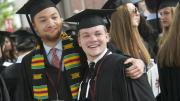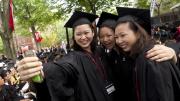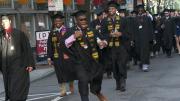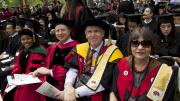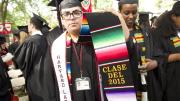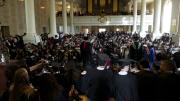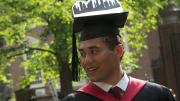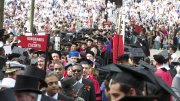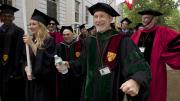The sun (graduation planners’ favorite celestial object) began burning through the morning murk at 5:50 a.m. By 6:10, a doctoral candidate, already in cap and gown, leaned over a stroller to kiss her husband as she and he and their befuddled toddler waited (naturally) for an inbound MBTA subway train from Alewife Station to Harvard Square. A summery morning stirred to life for the University’s 364th Commencement, and with it thousands of students stunned to find themselves awake and ambulatory at an unaccustomed hour—on their best behavior for adoring parents, loved ones, and the gathering throng. Soon they and 10 honorary-degree recipients (see below) would be in proud possession of their Harvard diplomas, somewhat damp with humidity but unmolested by so much as a drop of rain during the morning festivities.
The Setting
An Arctic winter battered Massachusetts. Harvard was shuttered for three days in three weeks—tying the number of snow days for the entire twentieth century, President Drew Faust told the College seniors in her Baccalaureate address on Tuesday, May 26. By then, an up-and-down spring (frost had threatened western Massachusetts the prior weekend, and the Commonwealth slid into a deepening drought) had given way to early stickiness. In time for the University’s graduation marathon, what passes for heat in New England put in its first sustained appearance. Weather-savvy proud parents posed their graduates-to-be for photos in front of Widener Library at 7:45 a.m. The morning breeze may have tousled a lock or two, but better than having an A.B.-to-be melted by the end of the Baccalaureate that afternoon, when the temperature peaked at 86 degrees and the humidity oozed up, too: perfect Cape Cod weather. The warmth brought hints of thunder and rain for fretful Commencement planners to fret about. Media credentials for the Big Day on Thursday featured a photograph of Deval L. Patrick, the former governor of Massachusetts and featured speaker, in a tweedy jacket; one hoped he had donned something much lighter underneath his doctoral gown.
At 5:30 p.m. on Tuesday, still in the 80s, buses disgorged College class of 1950 and 1955 reunioners outside the Faculty Club. Some walked slowly, and a few used canes. But their spirit was Harvard strong, their summer sport coats and blazers were natty and well pressed, and they seemed resilient: less affected than their flip-flop-wearing successors of Century 21 by a bit of heat.
Wednesday morning early, the grounds crew was tidying up Massachusetts Avenue outside Harvard Yard, sweeping away the seasonal snowfall of elm seeds, geranium petals, and locust blossoms brought down by brisk, damp breezes. Tuesday’s sun had proved enough to wilt the campus azaleas, but not to obliterate the rhododendrons. In preparation for myriad class days, Harvardians were about to find out what it is like to hold Commencement week, in academic garb, during summery weather—86 muggy degrees by mid afternoon. Gusty winds made it seem cooler, barely, briefly, but guests reported that it was hot. The breezes ruffled the feathers of at least one of Harvard Square’s resident wild turkeys, seen crossing Prescott Street shortly before 5 p.m. Was it scoping out a way to crash the gates at the honorands’ dinner in Memorial Hall at 6:30—or, perhaps, an unticketed flight path into Tercentenary Theatre Thursday morning? Only the turkey knew, of course—and it kept its counsel. No matter, the stage was set for the graduates’ Main Event.
The Players
During the Morning Exercises (read the program here), the University conferred honorary degrees on six men and four women (background on each is available here)—among them:
- a Nobel laureate in physiology or medicine, and a preeminent art historian, the daughter of another Nobel laureate (in economics);
- an African-American public-interest lawyer who leads efforts for reform of the criminal justice system and against the death penalty, and an African physician who has cared for women and campaigned against rape and sexual violence as an instrument of war in the Democratic Republic of the Congo;
- the geoscientist and oceanographer who is popularly associated with coining, in 1975, the term “global warming” (in this year of campus protests advocating divestment from fossil-fuel producers); and
- a pioneering political scientist, and the former governor of Massachusetts.
Students received 7,736 degrees and 32 certificates; undergraduates in Harvard College earned 1,612 of those degrees.
The Exercises Begin
After the exercises were called to order at 9:48 a.m.(under partly cloudy skies, with breezes keeping temperatures to the mid 70s, and humidity to match), in keeping with a trademark of President Drew Faust’s Commencement rites (the honorand-as-entertainer, who livens up sleepy graduates-to-be during the Tercentenary Theatre proceedings), opera (and increasingly, pop) star Renée Fleming—coyly identified in the program only as "Soloist"—sang “America the Beautiful.” She was accompanied by student musicians who played a cello, a violin, and an acoustic guitar. The imminent doctor of music would soon join the recent line of distinguished honorand/alumni performing artists: trumpeter Wynton Marsalis (2009); tenor Plácido Domingo (who serenaded fellow honorand Ruth Bader Ginsburg in 2011); poet Seamus Heaney reading his famous Harvard villanelle (2012); hugger extraordinaire Oprah (2013); and soul singer Aretha Franklin (2014).
The chaplain of the day, Tammy McLeod, who represents Cru (the former Campus Crusade for Christ, the evangelical organization, among the Harvard Chaplains), then offered the opening prayer.
Following the Commencement Choir’s rendition of Domine salvum fac, by Charles Gounod, it was time for talk. The traditional student orations (now called “addresses,” perhaps to make them seem less forbidding and to encourage more applicants to compete for a part) were delivered by James Paul McGlone ’15 (the Latin salutatory and its English translation; Jacob Silberg ’15 (the Senior English Address); and Anna F. Wang Erickson, Ph.D. ’15 (the Graduate English Address).
“Quid Durat?” (“What Lasts?”): Latin Salutatory
McGlone, a history concentrator who pursued a secondary field of study in the classics, is from Boonton, New Jersey. The former Kirkland House resident studied the premodern intellectual history of Western civilization (his thesis concerned some of the political writings of Saint Augustine), and, when not steeped in those texts, was heavily involved, he reports, in the Harvard Catholic Center, and was a member of the John Adams Society (“a conservative debating club”) and president of Harvard Right to Life. To relax after undergraduate rigors, he will spend much of the next year in Rome at the Paideia Institute, a nonprofit foundation that promotes study in the classics and humanities, including immersion in Latin and ancient Greek as “living” languages. (Read the Gazette biographies of McGlone and his fellow student speakers here.)
He instructed his listeners (read his text here) on both the priority of Harvard and the pleasant obligations of soon-to-be alumni:
Ac velut illi canes Yalenses arenam vel suam vel nostram quotannis intrant et quotannis discedunt gementes et flentes, illos dies memoria tenentes cum interdum vincerent; haud secus nos redibirnus et iuventutem laetam meminisse dolebimus.
(And just as those dogs of Yale each year enter either our stadium or their own, and each year depart mourning and weeping, remembering those days when they used to win once in a while: in the same way we will return to recall our happy youth.)
Then, mixing historical and classical perspectives, McGlone recalled the University’s (muddy!) anniversary bash during his class’s freshman year and the cold winter just past, and projected a future when the campus would resemble a mash-up of the Roman Forum and the fallen colossus of Ramses II (featuring guess who—and with McGlone acting out the appropriately prone posture):
…as we celebrated our alma mater's three hundred seventy-fifth anniversary: a lifespan unparalleled across the whole country!
But without a doubt, even the proudest strongholds fall to the twists of fate. Imagine in some future century, which reverently calls our own time “antiquity,” a passing traveler looking out over the ruins of Harvard. He marvels at the fall of so great a city, filled with so many distinguished men. He is utterly stunned by the columns lying broken here and there, the statue of John Harvard lying on its back, the empty marble and brick temples, not of the gods and goddesses but of the arts and sciences. As he beholds the Houses covered in dust—much like New Haven today!—he sighs from the depths of his heart for lost greatness. What is there that lasts?
Never fear, though, my friends, for our University, though she does not herself last forever, has a monument more lasting and more beautiful than bronze or marble or brick: namely, the unbroken bond which, in the words of the poet Horace inscribed by our forebears over a gate to this Yard, unites the souls formed by our alma mater's teaching until the last day. Never abandon this bond, my classmates, but hold onto it and cherish it! May no storms scatter us, nor any winter chill the warmth of our brotherhood. Farewell!
“The Red Phone”: Senior English Address
Silberg, a social-studies concentrator from Maplewood, New Jersey, who lived in Adams House, has a special interest in American education policy. In his senior thesis, he used attendance data to prove what a lot of parents of American teenagers know only instinctively: that students are less likely to attend school as days get shorter, possibly because it is more difficult for students to wake up when there is less sunlight in the morning. His principal extracurricular role was as “Czar” (president) of The Immediate Gratification Players, an improv comedy troupe with which he performed throughout his College career; it took a one-word prompt from the audience each night and proceeded to do an hour of scenes based on that suggestion. Silberg also taught Boston and Cambridge fifth-graders about civic matters, such as the U.S. Constitution and the American political process. Next year, he will take his show on the road, using a Sheldon Traveling Fellowship to observe Spanish democracy and the parliamentary elections there.
Silberg spoke about the red landline telephones in dorm rooms (read his text here), and the kinds of connections made through such antiquated equipment, or cellular successors:
About a year ago, I received a call from a 16-year-old friend of mine named Avery. Avery had leukemia and I had had lymphoma several years earlier, so naturally he and I talked about…sports. On this particular call, he told me about his Make-a-Wish trip to the Super Bowl with Jamie Foxx and Leonardo DiCaprio. “Leo was the man,” he told me. “He was rocking a giant beard. And I met Kate Upton…and I was making her laugh…and she even gave me a kiss.” I teased that maybe there was a chance he would still get Kate's phone number, but I was so glad to hear he was doing well. Tragically, about a week later, Avery passed away. It wasn’t fair, what happened to Avery. But I am always so grateful that he and I shared that phone call. The warmth and the joy in his voice always give me strength.
That led him to larger points about connection and engagement with fellow human beings:
But, it is also easy to disengage in smaller moments. It is easy to answer, “How are you?” with “Busy,” to end a conversation rather than feel vulnerable by opening up. It is easy to sweetly lie to those people in Harvard Square holding clipboards, “I’ll be back soon,” and then avoid them for the rest of the day. It’s easy to be unavailable because each of us is working on something important. Engaging requires us to choose empathy, to set aside time for what is important to others.
But at Harvard, in ways big and small, we engaged. Here, we chose optimism over cynicism when we planned an educational trip to Israel and Palestine, or gave a voice to refugees the world had left in the dust of Western Tanzania. We watched fifth-graders beam on a field trip as their state senator told them that they were all actually her boss. It reminded us that our democratic political system, so often a punchline, can still inspire. We chose to appreciate each others’ gifts rather than view them as threats to our own. We brought a latte to a friend up all night in a lab across campus. We cheered together all over the world when Steve [Moundou-Missi] sank the shot to beat Yale as time expired. We chose empathy when we respectfully disagreed in class and said, “I’d just like to push back on that.” In these moments, we glimpsed a world as we want it to be.
Rather than worrying about changing the world as they scatter from the shared experience of Harvard, Silberg urged his fellow students to
…choose not to let the world change us. Let’s invite someone who looks lost to sit with us at lunch, like we might have in Annenberg. Let’s give our neighbors directions, like we would to tourists looking for the John Harvard statue. Let’s keep making time for our friends even when we have a million things we should be busy doing instead, like we did when we went out for drinks after our roommates turned in their theses, and like we did a second time, for more drinks, when our roommates got their theses back.
He concluded by summoning the image of President John F. Kennedy ’40, LL.D. ’56, installing a red phone to connect the Oval Office to the Kremlin, at a moment of particular peril and promise. In that spirit, he told his audience, “Today, it would be easy to pretend there is nothing we can do, to disconnect, to stash other peoples’ problems in the back of a closet or under a futon. But instead let’s connect our Red Phones, and be available for those small serendipitous moments when someone needs our time. Let’s engage….”
“A Disruptive Innovative Scalable Valuation”: Graduate English Address
Wang Erickson, from Prairie Village, Kansas, by way of Princeton, has studied in Harvard Medical School’s biological and biomedical sciences program and is earning her doctoral degree today in molecular and cellular biology, with a certificate in human biology and translational medicine. Her boundary-crossing work has been advised by Cabot professor of biology Richard Losick—a celebrated leader in sciences pedagogy at Harvard and nationwide. Undergraduates have been in her orbit, too—since 2010, she has been a resident tutor in Mather House—and her talk nicely combined experiences from the graduate and undergraduate perspectives. Wang Erickson also began with a warm bit of humor (read her text here) that might appeal to achievement-oriented Harvard students:
“Shoot for the moon and if you fall short, at least you’ll be amongst the stars.” It’s a nice sentiment. If only it were true. It’s more like “Shoot for the moon and if you fall short, you’ll be amongst the enormous amount of trash orbiting the Earth.” Now, that’s true! So don’t fall short. Maybe best not to shoot for the moon.
Why, she asked, ought one to “be bold, take risks, change the world”? The answer began to take shape for her from a conversation with an undergraduate:
One day over lunch, a student told me she was nervous about talking with a professor about a low exam score. Before she left, I said, “Just remember that you have intrinsic worth apart from your accomplishments.” She was stunned and said, “Is that really true? I mean, doesn’t everyone judge you based on your accomplishments?” Oh. Right. But the thing about intrinsic worth is that you have it inherently, it’s part of your personhood. You can’t earn it with accomplishments and therefore you can’t lose it with failures. Nothing can take it away. But it’s easy to forget since the world often reduces us to the sum of our achievements and has a long memory of our failures. It’s tough to believe something if no one else affirms it, even if it is true.
With a wry nod to the unromantic realities of living and studying in Boston and Cambridge (“Two weeks later, I saw the same student on the M2 shuttle heading back to Cambridge from the medical school. It’s two miles away. So during the next 45 minutes on the bus….”), Wang Erickson recounted being on the receiving end of the same conversation:
[S]he asked me how my research was going. Poorly, as usual, I replied. And immediately, she said, “Well, remember that you have intrinsic worth apart from your accomplishments!” I had to smile. A student actually remembered something I said!
Applying her own advice, she has come to see that
…recognizing intrinsic worth in other people broadens our perspective. My student later told me that knowing her own worth changed her life. How much more life-changing—disruptive even—would it be if we affirmed worth not only in ourselves but also in other people? What if we acted like it? Wouldn’t we be a bit more compassionate? A bit more considerate in criticism? A bit more courageous to fight injustice? How different our news headlines would be! A person has inherent value; it’s part of our shared humanity, and that should compel us to act boldly for the sake of others, even when it’s costly. Recognizing intrinsic worth simultaneously motivates and sustains us to take those risks to change the world.
And we mustn’t think that changing the world only applies to special people with special circumstances to help the poor or the sick or a developing country far away. Every person fundamentally desires to be fully known and fully loved despite their flaws—in essence, to have their intrinsic worth affirmed. So as my student did for me, remind each other in the midst of life’s trivialities and great opportunities: you have extraordinary worth apart from your accomplishments. Nothing can remove it, not even yourself. And if you live confident that your worth is already secure, then you might actually begin to change the world.
To the Degrees
The Commencement Choir sang the spiritual, “This Little Light of Mine,” arranged by Moses Hogan. Then, amid cooling breezes and clearing skies, Provost Alan Garber began the ritual of engaging the deans of the professional and graduate schools, who presented their candidates for the conferral of degrees, an act undertaken by President Drew Faust.
One player in these parts did so, unusually, in a second incarnation: computer scientist Harry R. Lewis appeared as interim dean of the School of Engineering and Applied Sciences. He had previously presented undergraduates for their “first degree in Arts or in Science,” when he was dean of Harvard College.
Deans performing their duties for the last time included Julio Frenk, who will depart the Harvard T.H. Chan School of Public Health in August to assume the presidency of the University of Miami, and David T. Ellwood, the longest-serving dean, who steps down from the Harvard Kennedy School’s helm on June 30.
Lewis, Frenk, and Ellwood were all recognized and commended for their service in Garber’s remarks. (President Faust recognized each during the honorands’ dinner Wednesday night, in Memorial Hall. She also thanked Cherry Murray, who stepped down as engineering and applied sciences dean last fall, and Thomas W. Lentz, departing director of the Harvard Art Museums, who led their renovation and reopening as of last November.)
The proceedings proceeded very much by the script. Among the departures, Dean Ellwood was greeted with chants of "Ellwood! Ellwood!" when he rose to speak his part. The go-getting M.B.A. candidates from Harvard Business School, directed by the provost to rise, had already done so, as he observed.
Rakesh Khurana, the College’s dean since last July (and, since the deanship was endowed this week as a result of The Harvard Campaign, the first Danoff dean of Harvard College), then received the customary rousing reception (augmented with chants of "Dean Rakesh! Dean Rakesh!") when he performed his undergraduate graduation duties for the first time.
Musical interludes included the Anthem, Psalm 78 (St. Martin's), and the Ralph Vaughn Williams Anthem, “O, clap your hands.”
The honorary degrees (see in-depth biographies here) were then conferred in the following order on:
- Wallace S. Broecker, Doctor of Science
- Robert M. Axelrod, Doctor of Laws
- Linda B. Buck, Doctor of Science
- Svetlana Leontief Alpers, Doctor of Arts
- Peter Salovey, Doctor of Laws (with a joke from Garber about the Yale president’s prior service in the exalted role of university provost; Salovey was greeted by the Harvard University Band with a few bars of the Yale fight song—but did not have the opportunity, as a founding member of The Professors of Bluegrass, to return the favor)
- Bryan Stevenson, Doctor of Laws
- Patricia Albjerg Graham, Doctor of Laws
- Denis Mukwege, Doctor of Science
- Renée Fleming, Doctor of Music (also saluted, with Dvořák, by the Commencement Choir)
- Deval L. Patrick, Doctor of Laws
During his toast to the University on behalf of the honorands Wednesday night, Patrick had noted that “honorand” is a term in use uniquely at Harvard—and in fact, he will be an honoree at University of Massachusetts Boston, tomorrow. Touching on multiple emotional chords, he recalled “42 years ago, sitting in a hard chair opposite Jack Reardon [’60, the longtime, and much-admired, former director of admissions, athletics, and the Harvard Alumni Association], being interviewed as a candidate for admission.” Upon being admitted, the first in his family to head for college, Patrick said, he called his grandmother, who yelled and screamed in excitement—before asking, about Harvard, “Where is that, anyway?” Aghast, he said, it took him some time to realize that she had gotten the point more quickly than he had: that what mattered was the opportunity to pursue a higher education, and not the prestige surrounding the institution where he would pursue it. He and his fellow honorands, and members of the dinner audience, he said, had fortunately been able to make the most of that opportunity.
And so, now, had thousands of other newly minted graduates.
Whereupon it was time for the Harvard Hymn; the benediction by the Pusey minister in Memorial Church (who urged all to "Go in peace. Speak the truth.…Be slow to criticize," and quoted Stevenson); the sheriff of Middlesex County’s customary loud adjournment, the clanging of bells; and, at 11:37 a.m., the march out to lunch and a cold beverage—with delight in the morning that had been, and a wary weather eye on the sky, lest thunderstorms compete with the amplified rhetoric scheduled for the Afternoon Exercises.
